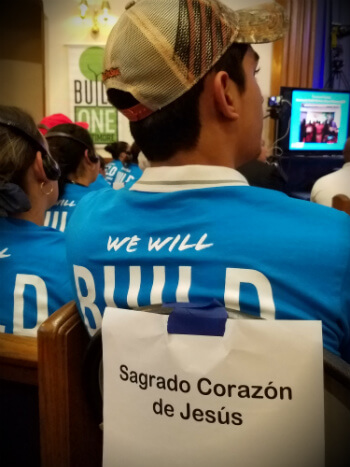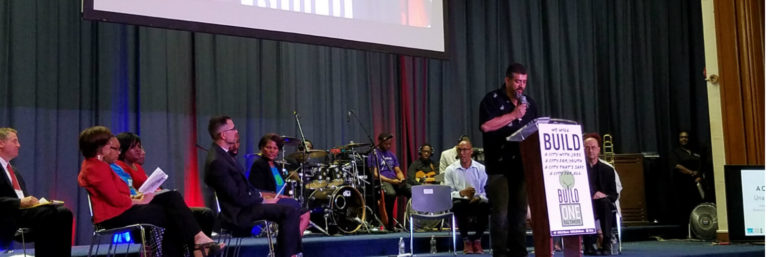Baltimore City Mayor Catherine Pugh announced June 6 that she will implement the Baltimore City Parish ID system for immigrants in the community. The Parish ID card will serve as a main source of identification for undocumented immigrants to access public and private services and, ultimately, as a symbol of inclusion.
The announcement was made during an assembly organized by BUILD (Baltimoreans United in Leadership Development), a local nonprofit organization composed of congregations, public schools and community associations that work to address Baltimore’s social and economic challenges. Pugh was present along with representatives from Baltimore City Police Department.
More than 500 parishioners from Sacred Heart of Jesus-Sagrado Corazón de Jesús parish in Highlandtown and its mission parish of St. Patrick in Fells Point attended the event at Kingdom Life Church in West Baltimore. It was the largest group in the venue. Parishioners from St. Matthew in Northwood also attended with a small delegation.
Redemptorist Father Bruce Lewandowski, pastor of Sacred Heart of Jesus-Sagrado Corazón de Jesús and a member of BUILD’s Clergy Caucus, said immigrants use their passport as an identification document, which is immediately called into question, especially when presented to law enforcement.

He added that, on many occasions, parishioners sought him first after becoming victims of a crime and asked him to call law enforcement on their behalf.
“(Parishioners) feel targeted and unsafe,” Father Lewandowski said. “They ask me to be there when they talk to the police because they fear they won’t be taken seriously or will end up cooperating with ICE (U.S. Immigration and Customs Enforcement).”
The Catholic Legal Immigration Network (CLINIC) describes the ability to prove identity in the U.S. as a “basic necessity that has been turned into an obstacle” for the immigrant community. It also talks about alternative identification cards as an effective way to address safety concerns and prevent crimes against immigrants.
Ever Castillo, a 43-year-old parishioner of Sacred Heart of Jesus-Sagrado Corazón de Jesus, asked Pugh to support the Parish ID program from the stage after recounting a frustrating interaction with law enforcement February 28 in Baltimore as he and his wife were trying to protect an elderly woman from being robbed and beaten.
“When the policed arrived, an hour later, they went straight to the attackers. They ignored me and what I had to say,” Castillo said. “I felt like trash. I tried to help an American citizen but it was I who was treated like a criminal.”
For weeks, the attackers harassed him and his family. Castillo called the police to report the disturbances every time, but he was told there had to be a physical attack before they could help. Finally, those same attackers allegedly entered the Castillo family’s home March 13, yelled racial slurs, stabbed Castillo and cut his teenage daughter’s face.
“This wouldn’t have happened if they hadn’t ignored my calls,” Castillo said. “As immigrants, as human beings, we deserve better. Without identification cards, immigrant families are an easy target for crime.”
Pugh briefly took the stage to emphasize that “safety and violence reduction have been a priority since I became mayor.” Additionally, she said she was fully committed to implement the Parish ID program.
“It will help undocumented citizens feel safe and as a part of the community,” she said. “We want you to know that Baltimore is a welcoming city.”
For Spanish version of this article click here.


